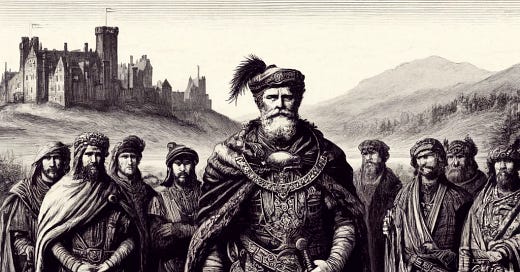William de Allot: The Ancestral Knight of the Scottish Eliots
When delving into the rich tapestry of Scottish genealogy, few names stand out as prominently as that of William de Allot, a Norman knight whose legacy laid the foundation for the esteemed Eliot family in Scotland. This blog post explores the life and significance of William de Allot, tracing his journey from the shores of Normandy to the Scottish Highlands and his enduring influence on the Eliot lineage.
The Norman Connection
The story of William de Allot begins in Normandy, a region known for its fierce warriors and strategic importance. As one of the knights who joined William the Conqueror in the historic Battle of Hastings in 1066, William de Allot's bravery and loyalty played a crucial role in the success of the Norman invasion. This pivotal event not only altered the course of English history but also set the stage for the establishment of noble families across Britain. Among the valiant warriors, William de Allot earned a place in the annals of history and the favor of the Conqueror, securing lands and titles that would benefit his descendants for generations.
The Scottish Migration
Following the Norman Conquest, many knights and nobles sought new lands and opportunities beyond England's borders. William de Allot was no exception. His journey took him to the Scottish Lowlands, a region known for its rugged beauty and strategic importance. Here, William de Allot became the progenitor of the Eliotts of Stobs and the Elliots of Minto, two distinguished branches of the family in Roxburgh, Scotland. The fertile lands and strategic locations in Scotland provided an ideal setting for establishing a lasting legacy. William's descendants quickly integrated into Scottish society, marrying into prominent families and securing influential positions.
Heraldic Heritage
One of the most fascinating aspects of William de Allot's legacy is the heraldry associated with the Eliot family. The original coat of arms bore a baton, Or, on a field, Azure, with an arm and a sword for a crest. The motto, "Per Saxa per Ignes Fortiter et Recte" (Through Rocks and Fires, Bravely and Justly), encapsulates the spirit of resilience and honor that characterized William de Allot and his descendants. This heraldic symbolism remains a proud emblem of the family's noble heritage. The crest and motto reflect the challenges faced by the family and their unwavering commitment to integrity and bravery, values that have been passed down through the generations.
The Eliot Lineage
The Eliot family's presence in Scotland extends back to the 14th century, with records showing the continued prominence of the Eliotts in the region. William de Allot's descendants played significant roles in the social and political spheres of Scotland, contributing to the country's rich historical narrative. Their influence extended beyond the borders of Roxburgh, shaping the cultural and historical landscape of Scotland. The Eliotts were involved in various aspects of Scottish life, from military service to governance, and their contributions were instrumental in shaping the course of Scottish history. The family's estates and holdings grew over time, reflecting their status and influence within Scottish society.
Bridging Scotland and England
While the Eliotts of Stobs and the Elliots of Minto flourished in Scotland, their connections to the English branches of the family in Devon and Cornwall highlight the enduring ties between the two regions. The shared heritage and lineage underscore the importance of William de Allot's legacy in shaping the genealogical map of the British Isles. His descendants continued to hold positions of influence and respect, bridging the gap between their Scottish and English roots. This interconnectedness allowed for the exchange of culture and ideas, enriching both the Scottish and English branches of the family. The movement of family members between Scotland and England also facilitated political alliances and strengthened the family's overall standing.
The Impact on Scottish Society
The influence of the Eliot family in Scotland extended beyond their immediate lineage. They were patrons of the arts, supporters of the church, and advocates for the development of their communities. Their involvement in local governance and their contributions to charitable causes left a lasting impact on the regions they inhabited. The family's dedication to education and public service set a standard for future generations, ensuring that the values of integrity, honor, and community involvement remained central to the Eliot legacy.
The Eliot Family in Historical Context
To fully appreciate the legacy of William de Allot and the Eliot family, it is important to understand the historical context in which they lived. The medieval period was a time of great upheaval and change, with shifting political alliances, wars, and the constant struggle for power. The Norman Conquest itself was a monumental event that reshaped the political landscape of Britain. Against this backdrop, the Eliot family's ability to adapt and thrive is a testament to their resilience and strategic acumen. Their story is intertwined with the broader narrative of medieval Britain, offering insights into the challenges and opportunities faced by noble families during this dynamic period.
Conclusion
William de Allot's journey from a Norman knight to the ancestral figure of the Scottish Eliots is a testament to the enduring legacy of bravery, honor, and resilience. His story is not just a chapter in the Eliot family's history but a reflection of the broader narrative of Scotland's noble heritage. As we trace the lineage and heraldic traditions of the Eliots, we honor the memory of William de Allot and his indelible mark on Scottish history.
The tale of William de Allot serves as a reminder of the interconnectedness of history, where the actions of a single knight in the 11th century continue to resonate through the generations, shaping the identities and stories of families across Scotland and beyond. Through the exploration of William de Allot's life and legacy, we gain a deeper understanding of the historical forces that have shaped the Eliot family and their enduring contributions to Scottish society.





